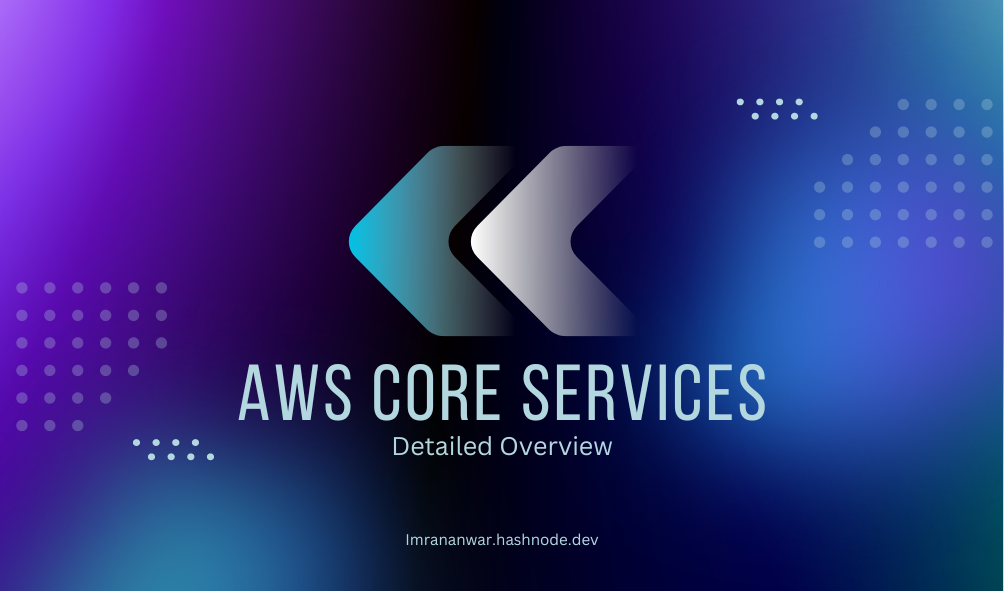Understanding the Core AWS Services
 Imran Anwar
Imran Anwar
In today's digital era, cloud computing is essential for businesses aiming to scale and innovate. Amazon Web Services (AWS) is a leading cloud provider, offering a wide array of services. This blog post delves into the core AWS services, providing detailed insights into how they can empower your organization.
1. Compute Services
Amazon EC2 (Elastic Compute Cloud)
Amazon EC2 offers resizable compute capacity in the cloud. It allows you to launch virtual servers as needed, making it ideal for applications that require scalable resources. Key features include:
Auto Scaling: Automatically adjusts capacity to maintain steady, predictable performance.
Elastic Load Balancing: Distributes incoming application traffic across multiple targets, ensuring high availability.
AWS Lambda
AWS Lambda is a serverless compute service that lets you run code without provisioning or managing servers. You pay only for the compute time you consume. Lambda is ideal for event-driven applications and microservices.
Key Benefits:
Automatic scaling: Handles requests automatically.
Cost-effective: Pay only for the compute time used.
Amazon ECS (Elastic Container Service) & AWS Fargate
Amazon ECS is a fully managed container orchestration service. AWS Fargate allows you to run containers without managing servers. These services simplify deploying, managing, and scaling containerized applications.
Features:
Integration with AWS services: Seamlessly integrates with services like IAM, VPC, and CloudWatch.
Security: Provides task-level security and IAM roles.
2. Storage Services
Amazon S3 (Simple Storage Service)
Amazon S3 offers scalable object storage with industry-leading durability and availability. It's suitable for data storage use cases such as backups, archiving, and big data analytics.
Key Features:
99.999999999% (11 9's) durability.
Lifecycle policies: Automatically transition objects to different storage classes.
Amazon EBS (Elastic Block Store)
Amazon EBS provides persistent block storage for Amazon EC2 instances. It is ideal for databases, file systems, and applications requiring access to raw, unformatted, block-level storage.
Key Benefits:
High performance: Optimized for low-latency, high-throughput workloads.
Snapshots: Take point-in-time snapshots for backup and disaster recovery.
Amazon EFS (Elastic File System)
Amazon EFS offers scalable file storage for use with Amazon EC2. It's designed for high availability and durability.
Features:
Scalability: Automatically scales up and down as you add and remove files.
NFSv4 support: Compatible with various Linux-based applications.
3. Database Services
Amazon RDS (Relational Database Service)
Amazon RDS is a managed relational database service supporting multiple database engines, including MySQL, PostgreSQL, MariaDB, Oracle, and SQL Server.
Key Features:
Automated backups: Enable point-in-time recovery.
Multi-AZ deployments: Ensure high availability and failover support.
Amazon DynamoDB
Amazon DynamoDB is a fast and flexible NoSQL database service, providing single-digit millisecond latency.
Key Benefits:
Fully managed: Automatic scaling, backup, and restore.
Global tables: Support multi-region, fully replicated tables.
Amazon Aurora
Amazon Aurora is a MySQL- and PostgreSQL-compatible relational database, offering the performance and availability of high-end commercial databases.
Features:
High performance: Five times faster than standard MySQL databases.
Scalability: Auto-scaling storage and up to 15 read replicas.
4. Networking Services
Amazon VPC (Virtual Private Cloud)
Amazon VPC lets you create a logically isolated section of the AWS cloud where you can launch AWS resources in a virtual network you define.
Key Features:
Subnets: Create public, private, and VPN-only subnets.
Security groups and NACLs: Control inbound and outbound traffic.
Amazon Route 53
Amazon Route 53 is a scalable DNS and domain name registration service, offering low-latency DNS resolution.
Key Benefits:
Health checks and failover: Monitor the health of your resources and route traffic accordingly.
Traffic flow: Manage traffic globally through a visual interface.
AWS Direct Connect
AWS Direct Connect establishes a dedicated network connection from your premises to AWS, providing a consistent network experience.
Features:
Lower latency: Improves application performance.
Bandwidth options: Choose between 1 Gbps, 10 Gbps, and higher capacities.
5. Security, Identity, and Compliance Services
AWS IAM (Identity and Access Management)
AWS IAM enables you to manage access to AWS services and resources securely, providing fine-grained access control.
Key Features:
Multi-factor authentication (MFA): Add an extra layer of security.
Role-based access control: Assign permissions to roles, rather than individuals.
AWS KMS (Key Management Service)
AWS KMS makes it easy to create and control the encryption keys used to encrypt your data.
Benefits:
Integrated with AWS services: Use KMS keys with S3, EBS, RDS, and more.
Compliance: Helps meet regulatory and compliance requirements.
AWS Shield
AWS Shield provides managed DDoS protection for applications running on AWS.
Key Features:
Automatic detection and mitigation: Protects against common DDoS attacks.
Advanced protection: Offers additional protections for sophisticated DDoS attacks.
6. Management and Governance
AWS CloudTrail
AWS CloudTrail enables governance, compliance, and operational and risk auditing of your AWS account.
Features:
Log delivery: Delivers log files to S3 for long-term storage.
Event history: Provides a history of AWS API calls for security analysis and troubleshooting.
AWS CloudWatch
AWS CloudWatch provides monitoring and management for your cloud resources and applications.
Key Benefits:
Alarms and alerts: Set thresholds and receive notifications.
Dashboards: Visualize metrics and logs in one place.
AWS CloudFormation
AWS CloudFormation allows you to model and set up your AWS resources using templates. This service automates resource provisioning and management.
Features:
Infrastructure as code: Manage infrastructure using code.
Version control: Track changes to your infrastructure.
7. Developer Tools
AWS CodeCommit
AWS CodeCommit is a source control service that hosts secure and scalable Git repositories.
Benefits:
Fully managed: No need to manage infrastructure.
Integration: Works with existing Git tools.
AWS CodeBuild
AWS CodeBuild is a fully managed build service that compiles source code, runs tests, and produces software packages ready for deployment.
Features:
Pay-as-you-go: Pay only for the build time you use.
Custom environments: Define custom build environments.
AWS CodeDeploy
AWS CodeDeploy automates code deployments to any instance, including Amazon EC2 instances and instances running on-premises.
Key Benefits:
Minimize downtime: Automatically handles the deployment process.
Custom deployment configurations: Define deployment strategies like blue/green and rolling updates.
8. Analytics Services
Amazon Redshift
Amazon Redshift is a fast, fully managed data warehouse that makes it simple and cost-effective to analyze all your data using standard SQL and existing business intelligence tools.
Features:
Columnar storage: Optimizes query performance.
Scalability: Scale from gigabytes to petabytes of data.
Amazon EMR (Elastic MapReduce)
Amazon EMR provides a managed Hadoop framework, making it easy, fast, and cost-effective to process vast amounts of data.
Benefits:
Integration with big data tools: Supports Apache Hadoop, Spark, HBase, and more.
Dynamic scaling: Automatically scale clusters up and down.
Amazon Kinesis
Amazon Kinesis enables you to collect, process, and analyze real-time, streaming data to gain timely insights and react quickly.
Key Features:
Real-time processing: Analyze data as it arrives.
Integration: Integrates with AWS Lambda, Amazon Redshift, and other services.
Conclusion
AWS offers a comprehensive suite of core services designed to help you build, manage, and scale your applications efficiently. By leveraging these services, you can ensure high availability, security, and performance for your cloud-based solutions.
Whether you are just starting with AWS or looking to optimize your existing infrastructure, understanding these core services is crucial for maximizing the benefits of the AWS cloud. Explore each service in detail, experiment with their features, and harness the power of AWS to drive your business forward.
Subscribe to my newsletter
Read articles from Imran Anwar directly inside your inbox. Subscribe to the newsletter, and don't miss out.
Written by

Imran Anwar
Imran Anwar
"My name is Imran Anwar, currently a third-year BTech student majoring in Computer Science and Engineering. While I am still in the process of gaining professional experience, my ambition is to excel as a DevOps Engineer specializing in cloud infrastructure. I have a keen interest and foundational knowledge in AWS, with aspirations to design, implement, and manage highly scalable architectures using core services such as EC2, S3, RDS, and Lambda. I am proficient in infrastructure as code tools like Terraform and CloudFormation and have hands-on experience setting up CI/CD pipelines using Jenkins and AWS CodePipeline. Additionally, my skills extend to container orchestration using Docker and Kubernetes, and I have implemented robust monitoring solutions using CloudWatch and Elasticsearch. I pride myself on being a quick learner and a problem solver, consistently seeking opportunities to expand my skill set and tackle challenges head-on. My strong communication and collaboration skills enable me to effectively engage with cross-functional teams, including developers and operations personnel. I am deeply passionate about cloud computing and am eager to leverage AWS services to drive innovation and deliver impactful business outcomes."